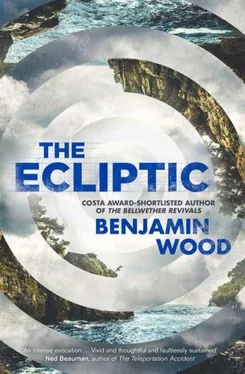I allowed a few moments to pass before stepping out. A sediment of dust teemed in the angling sunshine halfway down the hall, and I passed through it with the sureness of a child rushing at garden sprinklers. I had to tread softly while going at pace, and I felt certain that every time my boot soles clapped the parquet someone underneath was taking note. But I made it to the provost’s door. The brass key did not fit the lock. The other went in snugly, and it turned.
I did not expect to find the curtains drawn inside. The air was bitter with the stench of stubbed-out cigarettes: unmistakable. It was one of the broadest rooms in the mansion and the most ornate. The green velvet settees had been arranged to face each other, as though to host some tournament of conversation, and dangly crystal light fixtures were mounted on each wall. The provost had a hulking antique desk made out of cherry wood. The wallpaper was floral and intense. The rugs were vast and plush with mazy patterns, and cream upholstered chairs were placed in every corner (it was not quite clear what for). On the side-table was a silver tray of çay glasses with silver rims on silver saucers. The leather headrest of the provost’s desk-chair was dinted and worn down. (Seasons back, I had been shown this room during my introduction to the refuge — it had been a matter of some pride for him to explain the strange paperweight on his desk, a cast-iron seagull once owned by his favourite author: ‘I’ve been assured that it once sat on manuscripts of Gürpinar’s. The photographic evidence exists, I promise you.’ It had still been on the desk, several days ago, when the four of us had perched upon those green settees and heard him talk about some boy named Fullerton. How far away that afternoon now seemed. The paperweight was missing, too.) I was wasting time just standing there, gawking at the provost’s things. But the room was so luxurious in comparison to my lodging, and the urge to sleep on the soft cushions of the couch took some resisting. Every joint inside me ached. My brain felt panel-beaten.
I moved to the teak cabinet behind his desk. And there it was: the only telephone on the grounds. Its stand was fancy, golden, engraved with minute fretwork. The jade handset was so heavy that my elbow sank a little as I picked it up.
I heard a pigeon-cooing in the earpiece. The line was working.
I dialled zero for the operator. Nothing happened. After a moment, the crackling line scratched out. I tried again and got the same response. It had to be zero. Zero for the operator. Or had they changed it to 100? I dialled that instead.
‘ Hello. Operator. How may I help you? ’
I had assumed she would be Turkish.
‘ Hello? Did you need me to assist you? ’
I must have reached the international operator.
‘I need to place a call to London.’ It came out in a flurry.
‘ Can you speak up, please? I can’t hear you very well. ’
‘No, I can’t, I’m sorry.’ But I whispered it more plainly: ‘I need — to place — a call — to London.’
‘ Do you know the number, madam? ’
‘Only the name and the address.’
‘ I’ll need to take those down. ’
‘It’s Yail.’ I spelled it out, and she spoke it back to me using the phonetic alphabet. ‘His first name’s Victor. He’s a doctor, if that helps you find it.’ And I told her the address. ‘Please hurry.’
‘ I have the number for you now. It should only take a moment to connect. ’
A trilling noise, a trilling noise, a trilling noise. And then—
‘ Hello, you have reached the answering machine of Dr Yail and Dr Fleishmann, Harley Street Practice. ’ A man’s voice, but not Victor’s, very strained. ‘ Office hours are 10 a.m. to 7 p.m., Monday to Thursday. If you are calling outside these hours and wish to make an appointment, please leave your name and the number where we might contact you. Listen for the tone and speak as clearly as you can. Thank you. ’
‘Yes, this is an urgent message for Dr Yail,’ I said. ‘It’s very important, that I speak to—’
A long beep in my ear.
‘Hello? Is someone there?’
Just a fuzz of static.
I started again: ‘This is an urgent message, please, for Dr Yail. I have some very sad news about his son.’ I paused, tweaking the language in my head. ‘I’m afraid I have to let him know that Jonathan is dead. It happened early yesterday.’ It sounded so cold, so final. ‘I’m sorry I’ve had to leave it in a message like this. I really wish I didn’t have to be the one to tell you — I really am so sorry. . It’s Elspeth Conroy — Dr Yail knows who I am. You know who I am, Victor. It’s terrible, having to say all this to a machine. I suppose it must be early where you are. It’s early here . The sun has only just come up. . Victor, I really am sorry. I just had to let you know. Poor Amanda must be going mad with worry. But there was nothing we could do. He drowned himself — it was the dreams. They made his life such hell, but he. . He didn’t suffer. . It’s difficult to say exactly where I am. How well do you know Istanbul? If you can get a ferry out to Heybeliada, it’s—’ Another long beep. ‘Victor, are you there?’
But the line had cut off. I pressed the hook and pressed the hook, trying to get it back. There was nothing, just the dial tone. I hung up the receiver, thinking I would have to call again, but when? The provost hardly left his room. My only chance was gone.
I needed to get out.
The door seemed very distant now. I could not run. My chest was tight. I turned the handle, checked the hallway. Bright out there. All clear. But, coming out, I struggled with the lock. The brass key — so smooth before — would not go in. I fumbled with it, and I realised: the silver key, the silver. When I finally had it locked, I rushed away. Then someone stepped up to the landing. I grabbed at the dado rail to stop myself. My boots squealed on the floor. I almost knocked a picture off the wall: it swung around and settled.
Gülcan had the provost’s breakfast on a tray: orange juice, a rack of toast, and two boiled eggs. When she saw me, her arms flinched. The juice wobbled in the glass.
We did not speak. Her eyes were like a rabbit’s, darting, blinking. I put my palms together, mouthing ‘Please’. And, after a moment, she exhaled and nodded gravely. I carried on along the hall, straight past her, down the stairs, with the feeling in my gut that I had swallowed turpentine and chased it with a flame.

Breakfast was the third meal in a row that I had missed, and it prompted MacKinney to come knocking at the studio. She woke me from the darkest trenches of my sleep: dreams the like of which you only get from sheer exhaustion, that drag your fears out from the roots and shake their dirt off in your conscience. A butcher’s shop, a bloody floor, a mop and bucket — things that I was very glad to get away from. ‘Knell, it’s almost lunchtime. Are you in there?’ My window was still shuttered and the blinds still stapled back. Tape clung to the door in strips. ‘I’m coming in.’ She pushed inside.
I was on my couch under a pile of blankets. The tiredness had been too much — I had not lit the stove when I got back, just shivered into sleep.
Mac looked at me: ‘You have a bed, you know. I recommend you try it.’ Then at the mess: ‘Crikey. You’ve been painting.’
‘I’m as shocked as you are.’ I sat up, squinting at the room. The mural was propped up on the wall, covered by linens. ‘It’s not finished yet, though.’
She was already filling up a jug with water. ‘We thought you’d been ignoring us, but I suppose you’ve had your head in all of this. It didn’t even occur to me that, well, you know what I mean.’ There were no clean cups for her to pour the water into, so she passed me the whole jug. I glugged from the spout, soaking my chin and the front of my shirt. ‘So, what was it — a lightning bolt?’ she said. ‘Or total accident?’
Читать дальше













